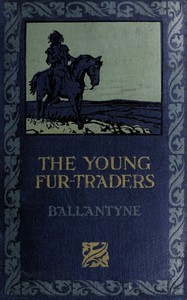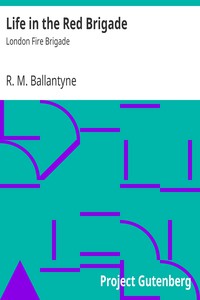Snowflakes and Sunbeams; Or, The Young Fur-traders: A Tale of the Far North by - (books under 200 pages .txt) 📗

- Author: -
Book online «Snowflakes and Sunbeams; Or, The Young Fur-traders: A Tale of the Far North by - (books under 200 pages .txt) 📗». Author -
Boat-travelling in those regions is conducted in a way that would astonish most people who dwell in the civilised quarters of the globe. The country being intersected in all directions by great lakes and rivers, these have been adopted as the most convenient highways along which to convey the supplies and bring back the furs from outposts. Rivers in America, however, as in other parts of the world, are distinguished by sudden ebullitions and turbulent points of character, in the shape of rapids, falls, and cataracts, up and down which neither men nor boats can by any possibility go with impunity; consequently, on arriving at such obstructions, the cargoes are carried overland to navigable water above or below the falls (as the case may be), then the boats are dragged over and launched, again reloaded, and the travellers proceed. This operation is called “making a portage;” and as these portages vary from twelve yards to twelve miles in length, it may be readily conceived that a voyageur’s life is not an easy one by any means.
This, however, is only one of his difficulties. Rapids occur which are not so dangerous as to make a “portage” necessary, but are sufficiently turbulent to render the descent of them perilous. In such cases, the boats, being lightened of part of their cargo, are run down, and frequently they descend with full cargoes and crews. It is then that the whole management of each boat devolves upon its bowman and steersman. The rest of the crew, or middlemen as they are called, merely sit still and look on, or give a stroke with their oars if required; while the steersman, with powerful sweeps of his heavy oar, directs the flying boat as it bounds from surge to surge like a thing of life; and the bowman stands erect in front to assist in directing his comrade at the stern, having a strong and long pole in his hands, with which, ever and anon, he violently forces the boat’s head away from sunken rocks, against which it might otherwise strike and be stove in, capsized, or seriously damaged.
Besides the groups already enumerated, there were one or two others, composed of grave, elderly men, whose wrinkled brows, gray hairs, and slow, quiet step, showed that the strength of their days was past; although their upright figures and warm brown complexions gave promise of their living to see many summers still. These were the principal steersmen and old guides—men of renown, to whom the others bowed as oracles or looked up to as fathers; men whose youth and manhood had been spent in roaming the trackless wilderness, and who were, therefore, eminently qualified to guide brigades through the length and breadth of the land; men whose power of threading their way among the perplexing intricacies of the forest had become a second nature, a kind of instinct, that was as sure of attaining its end as the instinct of the feathered tribes, which brings the swallow, after a long absence, with unerring certainty back to its former haunts again in spring.
The store.
At whatever establishment in the fur-trader’s dominions you may chance to alight you will find a particular building which is surrounded by a halo of interest; towards which there seems to be a general leaning on the part of everybody, especially of the Indians; and with which are connected, in the minds of all, the most stirring reminiscences and pleasing associations.
This is the trading-store. It is always recognisable, if natives are in the neighbourhood, by the bevy of red men that cluster round it, awaiting the coming of the storekeeper or the trader with that stoic patience which is peculiar to Indians. It may be further recognised, by a close observer, by the soiled condition of its walls occasioned by loungers rubbing their backs perpetually against it, and the peculiar dinginess round the keyhole, caused by frequent applications of the key, which renders it conspicuous beyond all its comrades. Here is contained that which makes the red man’s life enjoyable; that which causes his heart to leap, and induces him to toil for months and months together in the heat of summer and amid the frost and snow of winter; that which actually accomplishes, what music is said to achieve, the “soothing of the savage breast:” in short, here are stored up blankets, guns, powder, shot, kettles, axes, and knives; twine for nets, vermilion for war-paint, fishhooks and scalping-knives, capotes, cloth, beads, needles, and a host of miscellaneous articles, much too numerous to mention. Here, also occur periodical scenes of bustle and excitement, when bands of natives arrive from distant hunting-grounds, laden with rich furs, which are speedily transferred to the Hudson’s Bay Company’s stores in exchange for the goods aforementioned. And many a tough wrangle has the trader on such occasions with sharp natives, who might have graduated in Billingsgate, so close are they at a bargain. Here, too, voyageurs are supplied with an equivalent for their wages, part in advance, if they desire it (and they generally do desire it), and part at the conclusion of their long and arduous voyages.
It is to one of these stores, reader, that we wish to introduce you now, that you may witness the men of the North brigade receive their advances.
The store at Fort Garry stands on the right of the fort, as you enter by the front gate. Its interior resembles that of the other stores in the country, being only a little larger. A counter encloses a space sufficiently wide to admit a dozen men, and serves to keep back those who are more eager than the rest. Inside this counter, at the time we write of, stood our friend, Peter Mactavish, who was the presiding genius of the scene.
“Shut the door now, and lock it,” said Peter, in an authoritative tone, after eight or ten young voyageurs had crushed into the space in front of the counter. “I’ll not supply you with so much as an ounce of tobacco if you let in another man.”
Peter needed not to repeat the command. Three or four stalwart shoulders were applied to the door, which shut with a bang like a cannon-shot, and the key was turned.
“Come now, Antoine,” began the trader, “we’ve lots to do, and not much time to do it in, so pray look sharp.”
Antoine, however, was not to be urged on so easily. He had been meditating deeply all the morning on what he should purchase. Moreover, he had a sweetheart, and of course he had to buy something for her before setting out on his travels. Besides, Antoine was six feet high, and broad shouldered, and well made, with a dark face and glossy black hair; and he entertained a notion that there were one or two points in his costume which required to be carefully rectified, ere he could consider that he had attained to perfection: so he brushed the long hair off his forehead, crossed his arms, and gazed around him.
“Come now, Antoine,” said Peter, throwing a green blanket at him; “I know you want that to begin with. What’s the use of thinking so long about it, eh? And that, too,” he added, throwing him a blue cloth capote. “Anything else?”
“Oui, oui, monsieur,” cried Antoine, as he disengaged himself from the folds of the coat which Peter had thrown over his head. “Tabac, monsieur, tabac!”
“Oh, to be sure,” cried Peter. “I might have guessed that that was uppermost in your mind. Well, how much will you have?” Peter began to unwind the fragrant weed off a coil of most appalling size and thickness, which looked like a snake of endless length. “Will that do?” and he flourished about four feet of the snake before the eyes of the voyageur.
Antoine accepted the quantity, and young Harry Somerville entered the articles against him in a book.
“Anything more, Antoine?” said the trader. “Ah, some beads and silks, eh? Oho, Antoine!—By the way, Louis, have you seen Annette lately?”
Peter turned to another voyageur when he put this question, and the voyageur gave a broad grin as he replied in the affirmative, while Antoine looked a little confused. He did not care much, however, for jesting. So, after getting one or two more articles—not forgetting half-a-dozen clay pipes, and a few yards of gaudy calico, which called forth from Peter a second reference to Annette—he bundled up his goods, and made way for another comrade.
Louis Peltier, one of the principal guides, and a man of importance therefore, now stood forward. He was probably about forty-five years of age; had a plain, olive-coloured countenance, surrounded by a mass of long jet-black hair, which he inherited, along with a pair of dark, piercing eyes, from his Indian mother; and a robust, heavy, yet active frame, which bore a strong resemblance to what his Canadian father’s had been many years before. His arms, in particular, were of herculean mould, with large swelling veins and strongly-marked muscles. They seemed, in fact, just formed for the purpose of pulling the heavy sweep of an inland boat among strong rapids. His face combined an expression of stern resolution with great good-humour; and truly his countenance did not belie him, for he was known among his comrades as the most courageous and at the same time the most peaceable man in the settlement. Louis Peltier was singular in possessing the latter quality, for assuredly the half-breeds, whatever other good points they boast, cannot lay claim to very gentle or dove-like dispositions. His grey capote and blue leggings were decorated with no unusual ornaments, and the scarlet belt which encircled his massive figure was the only bit of colour he displayed.
The younger men fell respectfully into the rear as Louis stepped forward and begged pardon for coming so early in the day. “Mais, monsieur,” he said, “I have to look after the boats to-day, and get them ready for a start to-morrow.”
Peter Mactavish gave Louis a hearty shake of the hand before proceeding to supply his wants, which were simple and moderate, excepting in the article of tabac, in the use of which he was im-moderate, being an inveterate smoker; so that a considerable portion of the snake had to be uncoiled for his benefit.
“Fond as ever of smoking, Louis?” said Peter Mactavish, as he handed him the coil.
“Oui, monsieur—very fond,” answered the guide, smelling the weed. “Ah, this is very good. I must take a good supply this voyage, because I lost the half of my roll last year;” and the guide gave a sigh as he thought of the overwhelming bereavement.
“Lost the half of it, Louis!” said Mactavish. “Why, how was that? You must have lost more than half your





Comments (0)